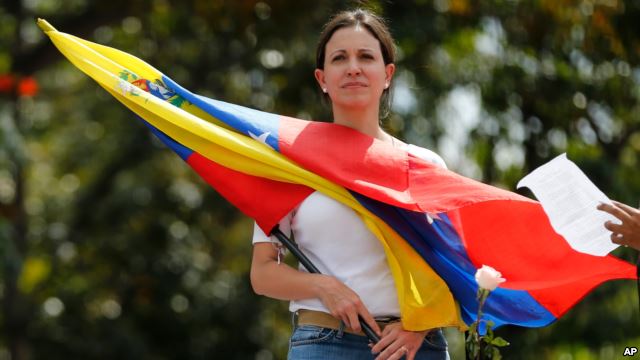In fact, the judgment was issued by the president of the National Assembly, Diosdado Cabello. No need for a recall referendum against her or to resort to the procedure of impeachment, Cabello decided on March 31, 2014, to throw opposition deputy María Corina Machado out of the Parliament.
The head of the National Assembly justified his decision by arguing that Machado had lost her mandate when she accepted the position of “Alternate Representative of the delegation of Panama” to the Organisation of American States (OAS). “You are no longer a Deputy, you will not have access to your seat in Parliament, you will not have access to the parking lot, you will not have access to the parliamentary office each of the members has, and we have only to follow the Constitution, and therefore your alternate Deputy Ricardo Sánchez will take your post, with all relevant functions and conditions,” Cabello explained.
A week later, on March 31, the Constitutional Chamber of the Supreme Court, in a joint presentation, endorsed Cabello’s position. Just as the vice-president of the ruling United Socialist Party of Venezuela, the judges criticised the fact that Machado agreed to act as Alternate Representative of Panama – a country with which Caracas had broken diplomatic relations – and concluded that she violated “the constitutional provisions governing the legislative service, the rules of office as Member of the National Assembly of the Bolivarian Republic of Venezuela, and duty as every Venezuelan to honour and defend their country.”
The opposition leader had used this option to explain her version of the Venezuelan crisis to the Permanent Council of the OAS. Heeding a request from the MUD, the then Secretary General of the OAS, José Miguel Insulza, said that the institution normally allows the “participation and right to speak at meetings of the political bodies of the OAS of representatives who do not necessarily have the nationality of the Member State they represent.” The precedents of these practices include one case in 2009, when the Government of Caracas endorsed the participation of the former foreign minister of Honduras, Patricia Rodas.
Machado, who won the most votes in the legislative elections of 2010, never got a chance to defend herself. She was not even allowed to enter the National Assembly to present their defence. In the end, although the measure adopted by Cabello and endorsed by the Supreme Court in theory was directed against one person, the truly affected were the 235,259 voters who lost their voice in the Parliament.
Extract of the judgment
The application of the legal consequence [loss of mandate] (…) is appropriate in this case, and lawful, as the deputy María Corina Machado accepted to act as an alternate representative of a country, regardless of the duration of this position, before an international body. Machado held the office of Deputy to the National Assembly, which is clearly incompatible during her term, because that diplomatic function not only is detrimental to the legislative function for which she was elected, but in clear contradiction with the duties as Venezuelan citizen (…) and as Member of the National Assembly (…) So it is declared”.
